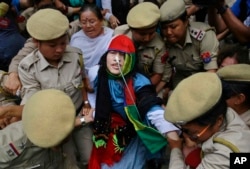Indian human rights activist Irom Sharmila has ended a 16-year hunger strike, vowing to continue her fight against a law that grants military immunity by entering politics.
Sharmila broke her fast in front of reporters Tuesday by licking honey from her hand. "I will never forget this moment," she said.
Earlier on Tuesday, a judge granted her bail after she assured him that she planned to resume eating.
The rights activist had been hospitalized and force fed through a tube in her nose after beginning her strike in November 2000.
She said she plans to run for office in the next elections in the remote northeastern state of Manipur, where she is from.
Sharmila began her fast after security forces, given wide powers under the immunity law, killed 10 people in the state, which has been long plagued by violent government crackdowns and separatist violence.
"I will use everything that I have for the positive change of the society," Sharmila said. "The foremost thing will be the removal of this draconian law."
She was charged with attempting suicide, which is a crime in India.
Her decision to end the protest comes as the federal government has asked its security forces to exercise restraint in responding to protests in the disputed Kashmir region. The Armed Forces Special Powers Act gives forces the right to kill suspected rebels without fear of prosecution and detain militants without warrants.






